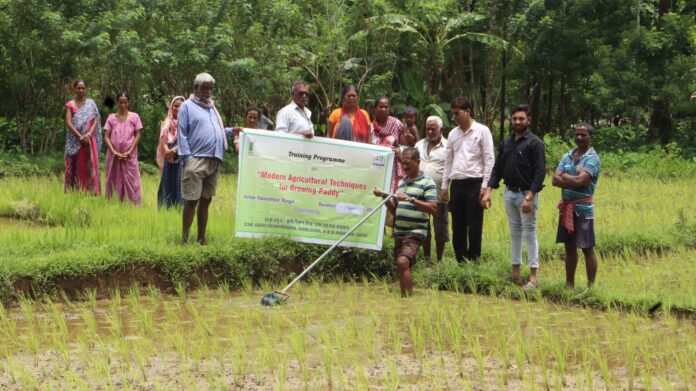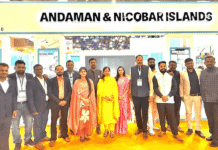The ICAR-Krishi Vigyan Kendra (KVK), Nimbudera, has organized a three-day training programme on modern agricultural techniques for paddy cultivation, aiming to equip farmers of Middle Andaman with improved knowledge and practical skills to enhance yield and profitability. The programme, held at Samiti Hall in Rangat from August 21 to 23, drew participation from 31 farmers and farm women across the region.
The training began with an inaugural session graced by the Pradhan of Parnasala Panchayat, Shri Balamurugan, who served as the chief guest. Addressing participants, he emphasized the importance of adopting scientific methods and sustainable farming practices, noting that the adoption of modern technology can significantly transform the income levels of rural households. He urged farmers to view agriculture not just as a tradition but as a modern enterprise that can ensure food security for the islands.
Dr. V. Damodaran, Senior Scientist and Head of KVK Nimbudera, elaborated on the crucial role paddy cultivation plays in the island economy. He said that while paddy remains the staple crop of Andaman households, it is often challenged by limited resources and changing climate patterns. According to him, introducing scientific techniques suited to island conditions can overcome these barriers and make farming more resilient.
The training sessions were structured to cover the full cycle of paddy cultivation, from seed selection to post-harvest practices. Assistant Director of Agriculture, Shirley Thomas, highlighted various government schemes available to support farmers, including the Pradhan Mantri Fasal Bima Yojana (PMFBY). She explained how crop insurance can protect farmers from losses caused by natural calamities, thereby encouraging them to take risks in adopting modern practices.
One of the most detailed sessions was conducted by agronomy specialist Rakesh Dawar, who presented the recommended package of practices for paddy cultivation in the islands. He trained participants in selecting healthy seeds, preparing nurseries, and ensuring better crop establishment through improved transplanting techniques. Dawar also stressed the scientific use of organic manures and integrated nutrient management to maintain soil fertility while reducing dependency on chemical fertilizers. A live demonstration of the Conoweeder, a tool designed to reduce manual drudgery, allowed farmers to witness firsthand how mechanization can improve efficiency.
Other sessions covered multiple aspects of modern farming. Agricultural engineering expert Er. Manoj Kumar spoke on mechanization and how tools and equipment can reduce labour needs while improving productivity. Subam Debroy, Subject Matter Specialist (Aquaculture), discussed the potential of paddy-cum-fish culture, a method that integrates rice and fish farming to maximize land use and provide additional income. Meanwhile, Yatharth Sharma, specialist in Home Science, guided farmers on post-harvest processing and value addition techniques that can enhance market value and income from paddy.
Farmers also engaged in interactive sessions, where they were trained to identify nutrient deficiencies and physiological disorders in paddy crops. Many shared experiences of recurring issues like pest infestations and unpredictable rains, and experts provided tailored solutions suitable for the unique conditions of the islands.
Participants expressed appreciation for the programme, noting that the combination of theory and practical demonstrations offered them a clearer perspective on how to modernize their practices. Several farmers said they were keen to adopt integrated approaches and mechanization tools to improve yields in the upcoming season.
Officials from ICAR-KVK Nimbudera noted that the training was part of their larger mission to promote island-specific agricultural innovations. By focusing on productivity, resilience, and sustainability, the initiative is expected to contribute to both food security and economic stability in Andaman farming communities.
The three-day programme concluded with a reaffirmation from organizers that such capacity-building efforts would continue to be extended across different regions of the islands, ensuring that more farmers can benefit from the advantages of scientific farming.





